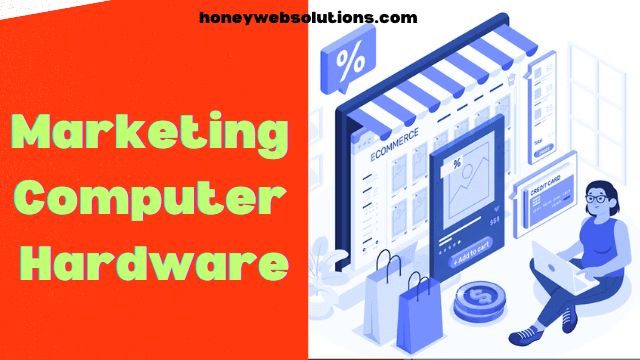
Unlock Your SEO Potential With These Strategies For Marketing Computer Hardware
The computer hardware market is a highly competitive industry, with countless businesses vying for the attention of tech-savvy consumers. With so many options to choose from, how can you ensure that your brand stands out from the crowd? The answer lies in search engine optimization (SEO). By optimizing your website and content for search engines, you can improve your online visibility, attract more traffic to your site, and ultimately boost your sales and revenue. In this blog post, we’ll explore the key strategies for unlocking your SEO potential and dominating the computer hardware market. From keyword research and on-page optimization to link building and content marketing, we’ll give you everything you need to know to take your SEO strategy to the next level. So, whether you’re a small business just starting out or a seasoned industry leader, read on to discover how SEO can help you achieve your business goals.
SEO is a Marketing Strategy that Can be Used by Anyone with a Website and a Product to Sell
Table of Contents
SEO is a marketing strategy that can be used by anyone with a website and a product to sell. The goal of SEO is to help you get more traffic, which leads to more sales. There’s no doubt that if you’re selling computer hardware on Amazon, then you want as many people as possible coming across your listing, so they can buy what you’re selling!
The best way to do this is through SEO. With SEO strategies in place, your products will show up higher in Google searches and other search engines like Bing and Yahoo!
Here are Some Strategies for How You Can Optimize Your Content to Rank Well in Search Engines
SEO is a marketing strategy that can be used by anyone with a website and a product to sell. It’s important to note that SEO is not just for tech companies, but for any business in general.
The following strategies will help you optimize your content, so it ranks well in search engines like Google and Bing:
Focus on the User Experience
The user experience is absolutely vital to your marketing computer hardware strategy. If users can’t find what they’re looking for on your website, or if the site takes too long to load, they will move on and never come back. To ensure that this doesn’t happen:
- Think about how the user will feel when they visit your site. Do you want them to feel relaxed and confident? Or rushed and stressed out? Your choice of colors and fonts can affect their mood as well as help them navigate around the page more easily
- Make sure that it’s easy for visitors (and search engines) to get around without getting lost in all those links at the bottom of each page–make sure there are no dead ends! This means making sure every link leads somewhere useful, like another page within one section or subcategory rather than just sending someone back into an endless loop of other links that lead nowhere specific enough for anyone who may have landed there by accident looking specifically for something else entirely unrelated but still related enough so that if we needed it later on down the road (but not necessarily right now), then maybe later would be better because right now isn’t working either because we’re busy doing something else important right now like eating dinner with family members who mean more than anything else ever could…
Write Quality Content
The first and most important thing you can do is write quality content. This means that your articles, blog posts and other types of writing should be useful to your audience and well-researched, accurate and easy-to-read. Your content should also be engaging–you want people who visit your website or blog to stick around long enough for them to read what you have written!
To make this happen, use keywords in all of your titles and meta descriptions (the summary at the top of each page). A title tag should include one keyword phrase or key phrase per sentence within it; a meta description should include two keywords or key phrases per sentence within it (this helps Google understand what type of information can be found on that particular webpage).
Use your keywords in all of your content, but don’t overdo it. Your writing should flow naturally and not sound like an advertisement or sales pitch. Make sure that every sentence has a clear purpose; don’t just throw in keywords for the sake of SEO–they won’t be effective if they don’t make sense! Write about topics that you know well and enjoy talking about (if you aren’t passionate about what you write about and why people should care, then no amount of copywriting will help).
Optimize Your URL Structure
When it comes to SEO, your URL structure is crucial. You want to optimize the content of your URLs so that they are keyword-rich and easy for search engines to understand.
Here are some best practices:
- Use keywords in the URL instead of underscores, hyphens or periods.
- Don’t use spaces between words in the URL – this can cause issues with how Google indexes websites and may cause problems with page ranking if you have multiple pages on one domain name. You can separate words using dashes instead (like www.word1-word2).
Optimize Your Title Tags and Meta Descriptions
You should also optimize your title tags and meta descriptions. A title tag is the name of your page that appears in the browser bar, while meta descriptions are short descriptions of what users will find on that page. Both are important for search engine optimization (SEO), but they’re especially crucial for hardware companies because they help people decide whether to click through to your site from search results.
The goal with both is to make sure each one is unique across all of your company’s pages, so you don’t dilute their effectiveness by using similar wording across different products or pages on your site. You also want them descriptive enough, so people know what they’ll find when they get there–but not too long! Make sure there isn’t too much information jammed into these two lines; otherwise it may cause visitors’ eyes to glaze over before they even reach whatever content lies below those lines on each page of content!
SEO isn’t Just Something You Do in Order to Get Ranked Highly
SEO isn’t just something you do in order to get ranked highly; it’s also about creating engaging content that makes people want to read more, so they’ll return to your site again and again (and buy more products!).
For example, if you’re looking to sell used computer equipment online, then you should have an article on why people should sell to you instead of other vendors. Or maybe a blog post on what the best laptops are this year–not just an overview of all the options available, but an in-depth analysis of each one, with pros/cons and recommendations based on personal experience.
Conclusion
In conclusion, marketing computer hardware can be a daunting task, but with the right SEO strategies in place, it can become a successful venture. By focusing on optimizing your website, creating valuable content, utilizing social media, and building quality backlinks, you can unlock your SEO potential and increase your visibility in search engine results pages. Remember to stay up-to-date with the latest SEO trends and algorithm changes to ensure that your efforts remain effective. Don’t be afraid to experiment with different strategies and track your results to see what works best for your business. With these tactics in your arsenal, you can set your computer hardware business apart from the competition and reach your target audience with ease. So, start implementing these strategies today, and watch your SEO efforts pay off in the form of increased traffic, leads, and sales.
Trending











